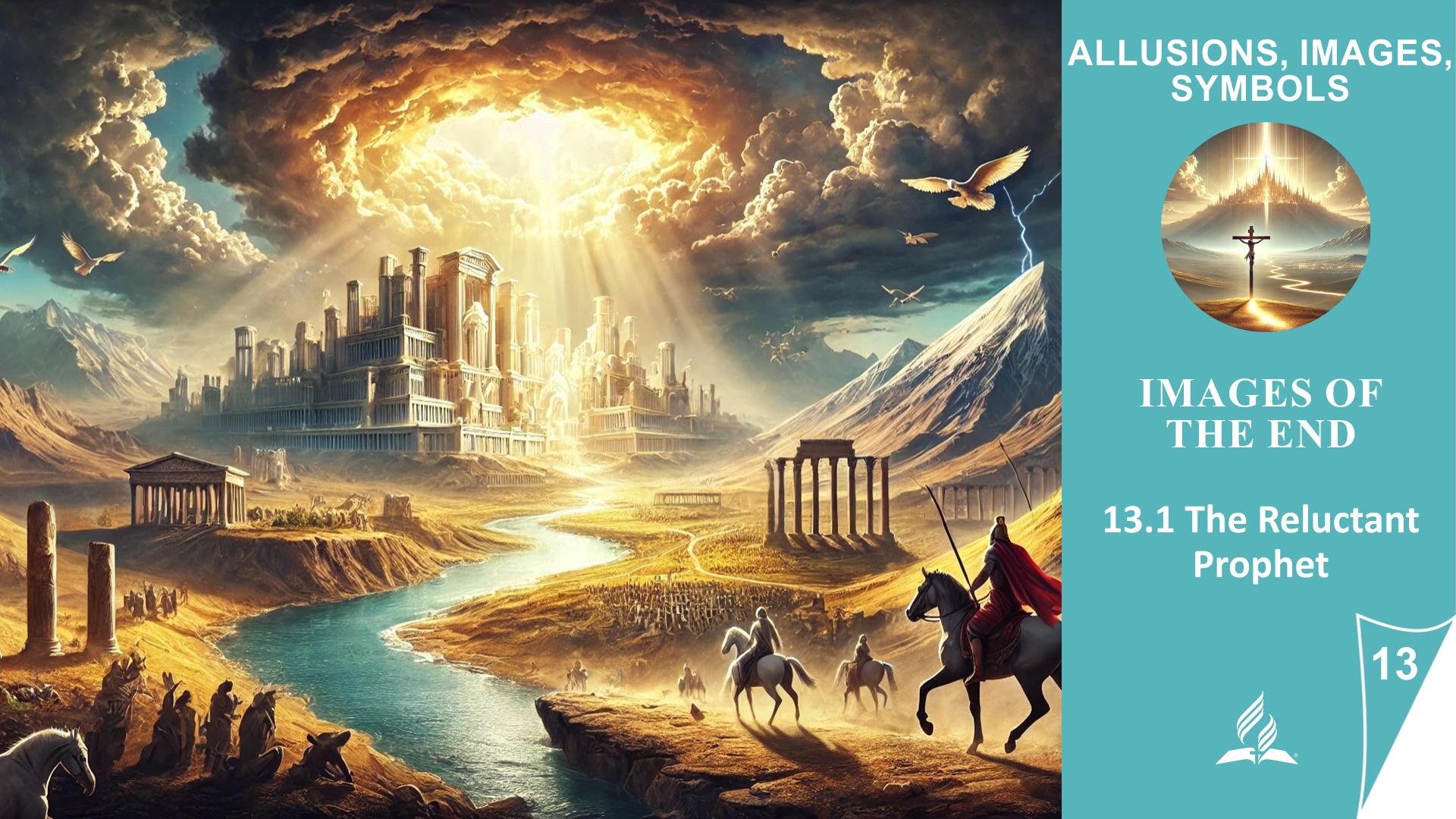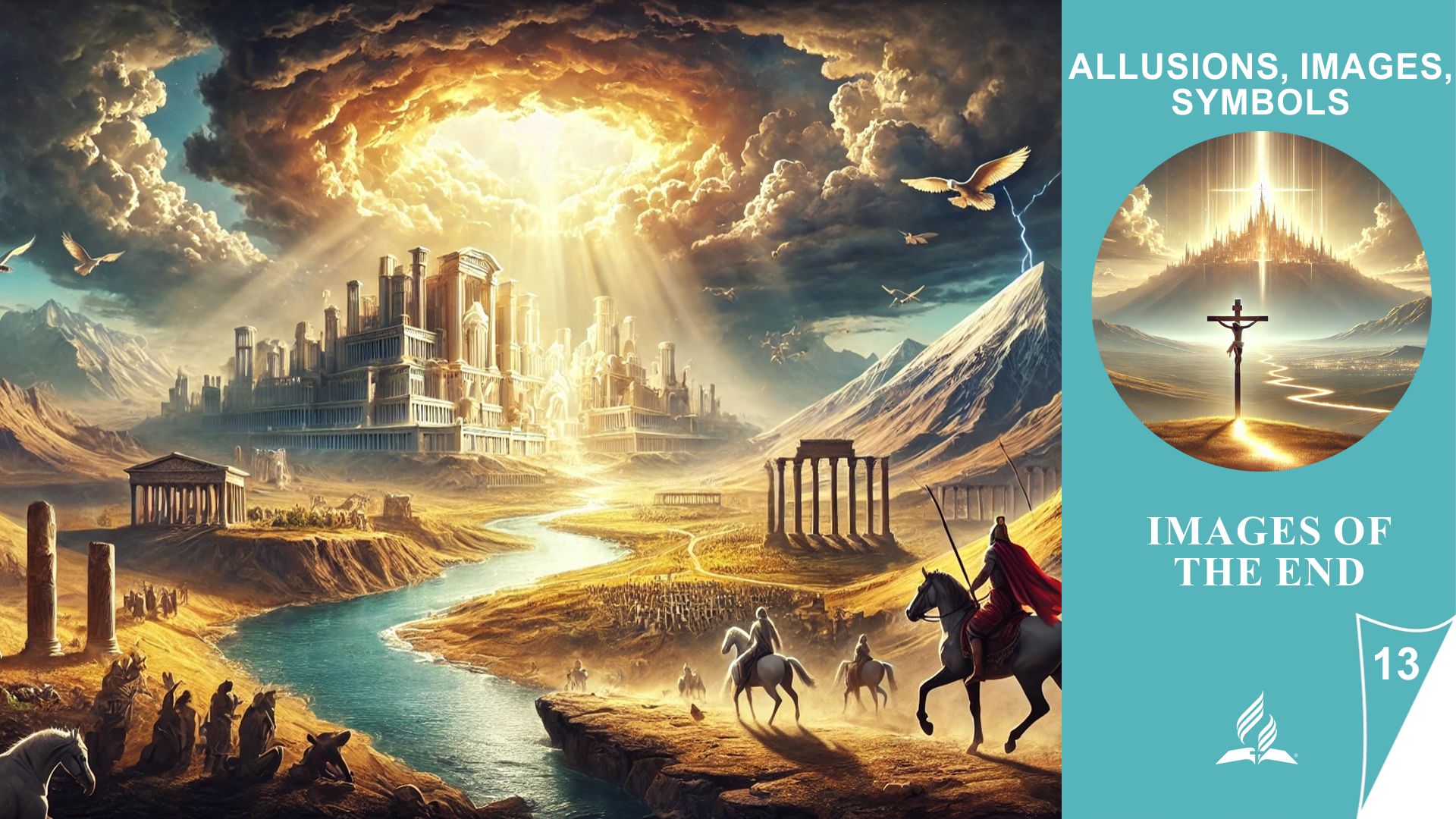


🟦 Introduction
The Bible is far more than a collection of ancient stories—it is a living testimony of divine guidance throughout the centuries. Lesson 13 invites us to look beyond the historical accounts and discover their deeper, prophetic significance. Whether it’s Jonah in the belly of the fish, Belshazzar’s fateful night, or the drying up of the Euphrates—each of these events contains clues about major happenings still ahead of us in the end times. These images serve as signposts on the spiritual map of the last days: they reveal God’s seriousness in judgment, but also His patience, grace, and faithfulness in salvation. Those who watch with an alert heart will see that God still speaks today through what happened yesterday. And He calls us to recognize the signs of the times and make a clear decision for Him—while grace still calls.

⛪ Lesson 13: IMAGES OF THE END
📘 13.1 The Reluctant Prophet
✨ Jonah – A Reflection of God’s End-Time Messengers
………………………………………………………………….
🟦 Introduction
There are stories in the Bible so human, so profound, and at the same time so prophetic that they endure through generations. The story of Jonah is one of them. A man of God who flees from his calling. A prophet who knows the voice of God—yet runs in the opposite direction. How is that possible? And how often do we see ourselves in that mirror?
Jonah is not just an Old Testament prophet. His story is a parable of our calling, our struggles—and God’s immense patience. In this lesson, we not only dive into the Old Testament account, but we examine it through the lens of the New Testament and end-time prophecy. What does Jesus say about Jonah? And what does it mean for us today—in the 21st century, in the midst of spiritual Babylon?
………………………………………………………………….
📖 Bible Study
Matthew 12:38–42 – Jonah as a Sign
“For as Jonah was three days and three nights in the belly of the great fish, so will the Son of Man be three days and three nights in the heart of the earth.” (Matt. 12:40)
Answer:
Jesus deliberately refers to Jonah—not because of his flight, but because of his time inside the fish. The fish becomes a symbol of the grave. Jonah seemingly returns from death to preach God’s word. Jesus, however, truly dies and conquers death forever. Just as Jonah preached repentance to the Assyrians, so Jesus proclaims the gospel to the world through His resurrection. Yet Jesus is “greater than Jonah”—He is the perfect sign of grace and judgment.
Jesus also reveals something about judgment: the people of Nineveh will testify against this generation because they repented. A serious warning: those who know the light and still do not turn back will be held accountable.
………………………………………………………………….
📖 Answers to the Questions
📌 Question 1: Read Matthew 12:38–42. Which parts of Jonah’s story does Jesus refer to when speaking to the scribes and Pharisees? What lessons about judgment can be found in His statement?
In Matthew 12:38–42, Jesus directly references the sign of the prophet Jonah to reveal a deeper spiritual truth. When the Pharisees demand a sign to prove His divine authority, Jesus does not perform another miracle. Instead, He points forward to what is yet to come—His crucifixion, death, and resurrection. These three days “in the heart of the earth” correspond to Jonah’s experience in the belly of the fish (cf. Jonah 1:17). This is not a superficial comparison: Jonah was seemingly dead and miraculously returned to deliver God’s message. Jesus truly died, conquered death, and brought eternal hope.
Jesus also addresses judgment: the people of Nineveh repented at Jonah’s preaching—with no signs or wonders, just God’s word. Now, someone greater than Jonah stands before Israel’s religious leaders—yet they remain unmoved. The judgment, therefore, will be even stricter for those who received greater light but chose to reject it.
This statement is both a solemn warning and an appeal: God gives signs, but the greatest sign is Jesus’ resurrection. Whoever recognizes this sign will understand that judgment is real—but so is salvation. Jesus’ words are prophetic, just, and full of grace.
📌 Question 2: How much of Jonah do you see in yourself? How can you overcome this wrong attitude?
Many Christians see themselves in Jonah—especially when they honestly examine their inner responses to God’s call. Jonah was not a skeptic—he was a prophet. He knew God’s voice, His holiness, and His grace. And that was the issue: Jonah knew that God forgives when people repent (cf. Jonah 4:2). But his national loyalty, fears, and perhaps pride got in the way. He didn’t want to be the vessel of grace to Nineveh—he believed they didn’t deserve it. That attitude is uncomfortably human.
We often face assignments that challenge us: loving a difficult person, standing for Jesus in a hostile environment, witnessing to an unconverted family. And sometimes we react like Jonah: fleeing, delaying, making excuses. But God’s patience doesn’t end with our resistance. He continues to call—and often uses the storms in our lives to bring us back on track.
Overcoming this attitude starts with humility. When I realize I am saved by grace alone, I will wish that same grace for others. Then I stop trying to control the outcome and focus on obedience. It’s God’s job to change hearts—not mine. My job is to go, preach, and love—even when it’s difficult.
Regular prayer, recognizing my own need, and trusting God’s strength help me say, like Jonah ultimately did, “Here I am, send me”—even when my heart still hesitates.
………………………………………………………………….
✨ Spiritual Principles
-
God doesn’t just call—He pursues.
-
The mission is more important than our comfort.
-
The message may be unpopular—but it is necessary.
-
God uses our weakness to show His strength.
-
Worship is inseparable from obedience.
Like Jonah, we are sent into a world that has forgotten God. The end-time message is not just an invitation to religion—it is a call to repentance. Revelation 14:7 calls us to worship the Creator—which is exactly what Jonah affirms before the sailors (Jonah 1:9).
………………………………………………………………….
🧩 Application for Daily Life
Jonah lived in a real world of political tensions, fear, and personal pride—just like we do today. Our “Nineveh” may look different—it might be a conversation with a neighbor, an invitation to a coworker, a testimony to strangers. But the calling remains. So does the fear. What’s different? We already have the sign: Jesus lives. The tomb is empty. What’s still holding us back?
Imagine if every believer lived today as though the salvation of hundreds depended on their faithfulness. Would that change your willingness?
………………………………………………………………….
✅ Conclusion
The story of Jonah is not a children’s tale. It’s an end-time story. A story of flight and return, judgment and grace. It’s a mirror for all who claim to be God’s people—especially in a time when Babylon is erecting its final walls. But God doesn’t call perfect people. He calls the willing. And He walks with them through the storm—until they reach the place He wants them to be: as messengers of His love, even in the capital of darkness.
………………………………………………………………….
💭 Thought of the Day
“God’s call may take you out of your comfort zone—but He will never leave you without His presence.”
………………………………………………………………….
✍️ Illustration – “Called but Fleeing”
David Krüger was 35, a theologian, influencer, and a man of principle. People loved his clear sermons, his calm voice, and his well-structured podcasts about the Bible and society. On social media, he was known as “the understanding reformer.” But few knew how often David wrestled with God in private.
One morning—just an ordinary Thursday—David sat with his coffee in his home office in Leipzig when he sensed a clear prompting in prayer: “Go to Riyadh. Proclaim My message.”
He froze. Riyadh? Saudi Arabia? A place where Christians are persecuted, where one can be imprisoned for speaking publicly about Christ?
David laughed nervously. Surely not from God. Maybe it was just the strong coffee.
But the message wouldn’t leave him. In the following days, he spoke with God—or rather, he argued. “Lord, You know what happens there. I’m not a missionary. I’m a theologian, a writer, a father! I can’t just go to Riyadh and tell them to repent!”
Instead of booking a ticket, David fled—not literally, but digitally. He declined a Middle East mission invitation and volunteered for a humanitarian project in Stockholm. It sounded like ministry. It felt “Christian.” But deep down, he knew: I’m going to Tarshish.
While he sat in air-conditioned rooms in Stockholm discussing peace, justice, and religious tolerance, a storm raged in his soul. At night, he couldn’t sleep. Over and over, he dreamed of a sun-drenched city, of people praying—earnestly, sincerely—and of a voice crying: “Yet forty days…”
One night he fell weeping from his bed. In that moment, he realized: I’m running. Not from a place. From God.
David returned home. Three weeks later, he was on a flight to Amman, Jordan. From there, he continued with a Christian aid organization to Riyadh. But instead of preaching in large gatherings, he spoke with people in cafés, discussed with liberal students in back rooms, answered questions about hope, forgiveness, eternity.
He didn’t speak loudly. But his words carried weight.
One evening, after a discussion group, a young man asked him,
“Why are you risking this, Mr. Krüger?”
David answered softly:
“Because God doesn’t want you to die—but to live.”




















